Key takeaways
- The post explains what sunflower seeds are, how they’re harvested, and why they’re commonly used for both edible seeds and oil.
- For keto, it describes ketosis basics and presents sunflower seeds as a snack/ingredient option that can fit a low-carb plan when you watch portions and total carbs.
- It includes practical serving ideas (using sunflower seeds in smoothies, sauces, baking, salads, and as a nut substitute) plus calorie/nutrition context.
- It also covers common questions (gluten-free status, pregnancy, diabetes, and weight gain) and emphasizes being mindful of individual needs.
If you follow eating trends regularly, you must have come across the ‘keto’ diet. This high-fat, low-carb formula is extremely popular with celebrities. In fact, people are coming on board keto every day in an attempt to start living healthy. One major grey area in keto concerns snacks. What can you munch on while staying true to the diet? Nutritionists suggest a wide variety of keto-friendly nuts and seeds. In this article, we are going to take a close look at sunflower seeds for keto.
What are sunflower seeds?
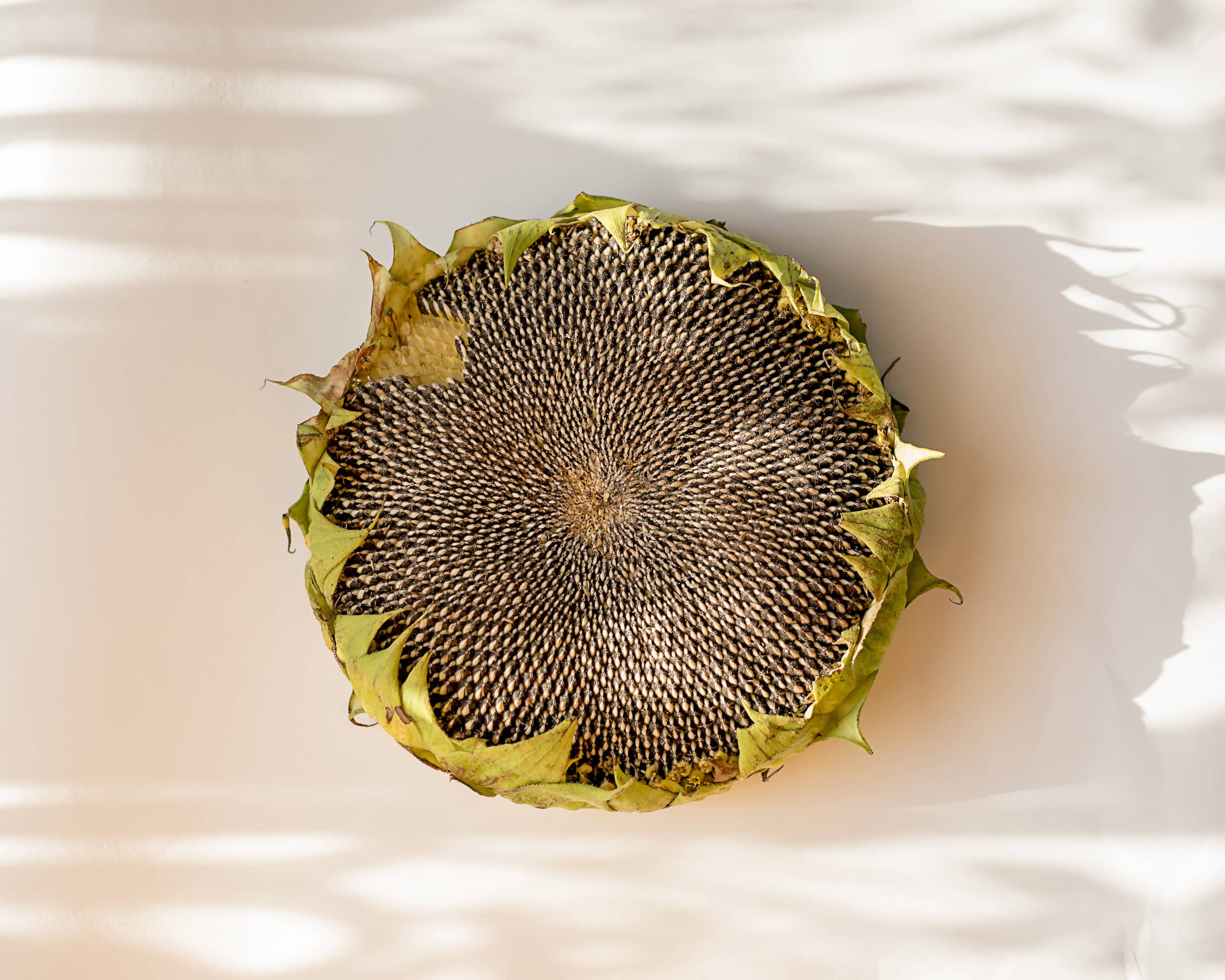
Sunflower seeds are the fruits of the Helianthus annuus, or the sunflower plant. It is the dark-colored cluster you see at the heart of the golden petals. The whitish, grey-green seeds are enclosed within tear-drop shaped husks. The seeds are available in the market in both forms: with and without the husks.
The sunflower plant is native to North America, where the indigenous people grew it as early as 4000 years ago. They were the first to domesticate the plant and cultivate the single stem variety, as we see it today. By the time the Europeans landed, the natives had already figured out how to extract oil from the plant’s seeds. The subsequent trades between Europe and the Americas took the plant to different parts of the globe. The USSR was the first to initiate the production and consumption of sunflower on a commercial level. Today, Ukraine produces most of the world’s sunflowers, followed by Russia, China, Romania, and Argentina.
How are sunflower seeds harvested?
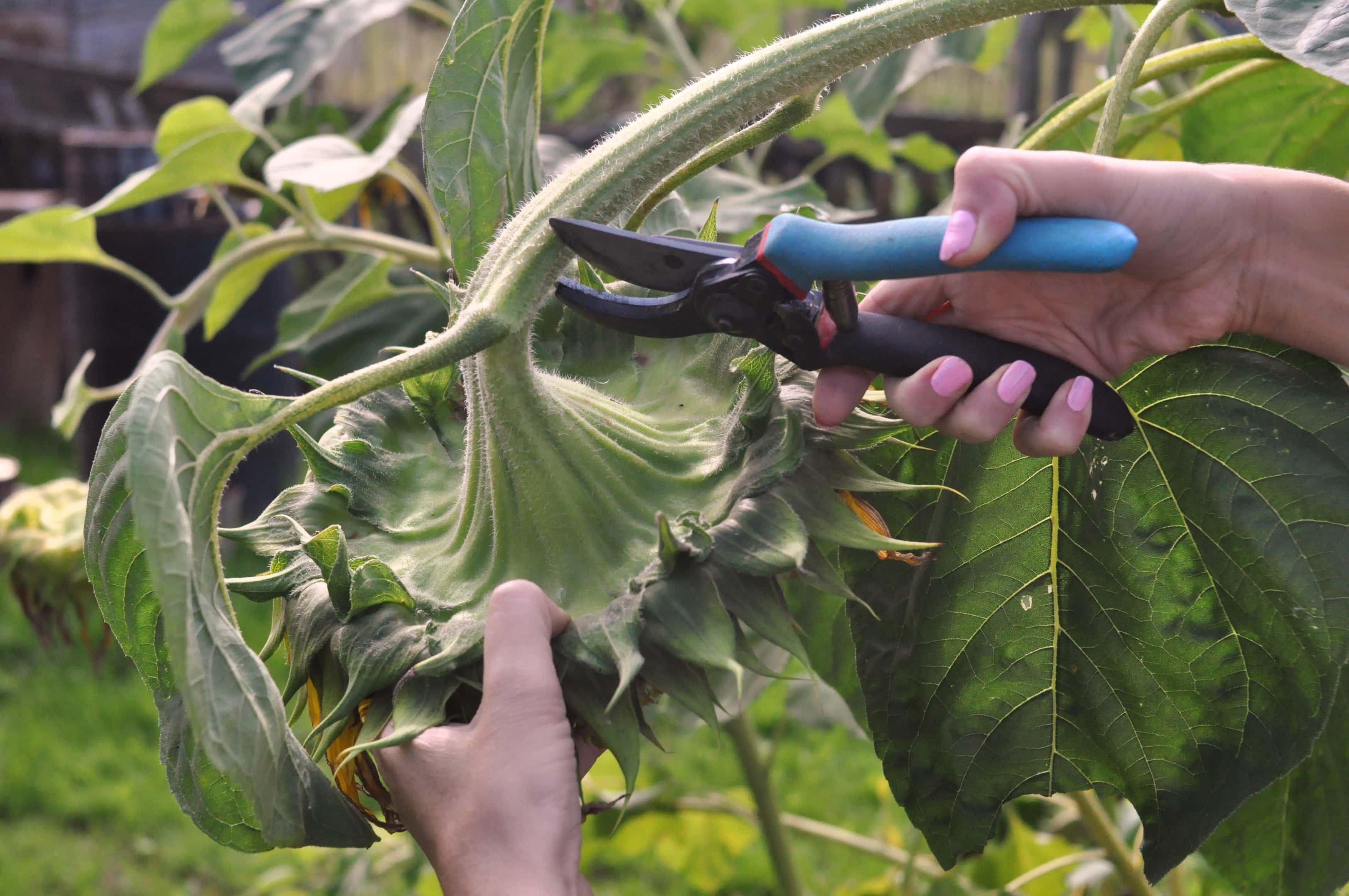
Sunflower seeds are primarily of three types that are categorized on the basis of their levels and types of fat, i.e, levels of monounsaturated, saturated, and polyunsaturated fats. Firstly, the most commonly used variant is linoleic sunflower seeds. The second is the high oleic variant, and lastly sunflower oil seeds. The patterns on their husks easily identify these types. Depending on the type, they are harvested mainly for edible oils and seeds. Farmers grow and harvest batches of specific sunflower crops depending on the type of industry to which they are supplying.
Sunflower oil comes from the seeds with solid, black husks. These are also known as oilseed sunflower crops. While the seeds are pressed to extract their oil, the remaining cake is kept aside as fodder for livestock. The sunflower seeds we consume as snacks come in striped or striated husks.
A single sunflower may contain as many as 2000 seeds. They are mainly produced for the extraction of edible sunflowers oils. However, with increasing research showing us the health benefits of sunflower, the raw seeds are entering mainstream meals as well.
Sunflower seeds and keto
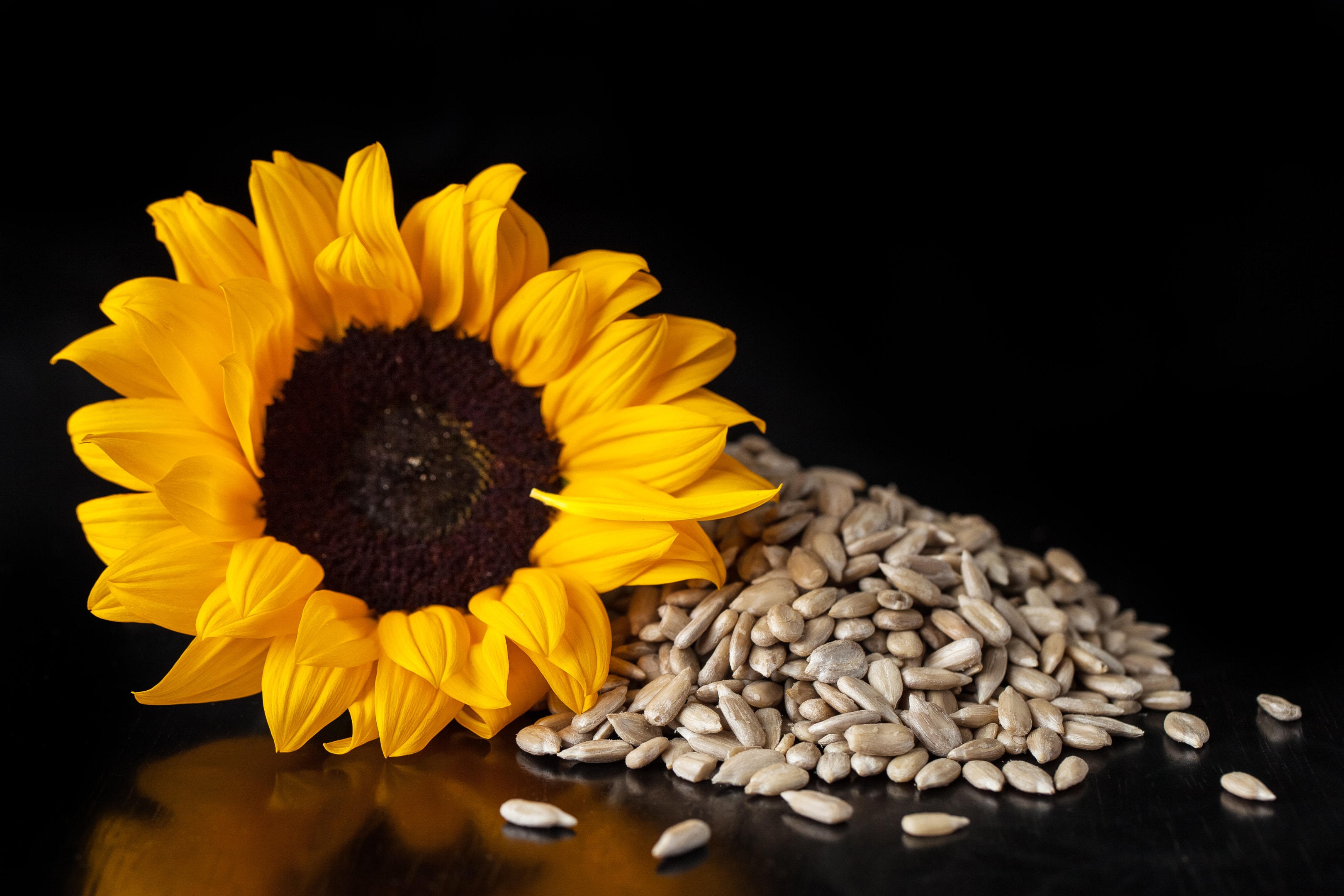
What is keto?
The ketogenic diet, more commonly known as keto, is a low-carb, mid-protein, and high-fat diet. If you have been looking for a meal plan that will help you lose weight without compromising your body’s nutritional needs, then keto is for you. Foods rich in healthy fats such as dark chocolate, certain types of cheese, and seeds like sunflower seeds are excellent for keto. This diet works by drastically cutting down your carbohydrate intake and replacing it with healthy fats instead. You may be wondering: how can anyone lose fat by eating more fats? Well, keep reading to find out.
How does keto work?
When we talk about sources of energy, carbohydrates are on the top. The digestive system converts carbs into glucose, which supplies the body with the energy that it needs. In regular diets, most people consume white carbs in the form of processed sugars, white bread, and flour. These not only lead to obesity but can also result in heart diseases and certain types of diabetes.
This is where keto comes in. The ketogenic diet inhibits carb intake by nearly 70% and increases the consumption of healthy fats instead. If the body lacks adequate carbs, the body enters a metabolic state called ketosis. When this happens, the body uses fats to produce molecules known as ketones. The metabolism then occurs through the burning of ketones instead of glucose to produce the necessary energy.
The ketogenic diet shows promising results in reducing blood sugar levels and improving overall health. However, before experimenting with any kind of diet, it’s essential to consult with a doctor to check for health risks.
Nuts and seeds for keto
Keto is super trendy among weight loss enthusiasts, but maintaining the diet can be tricky. Be careful about the quantity, as even accidentally consuming too many carbohydrates can knock you out of ketosis. This means you have to stay away from starchy vegetables, high-sugar fruits, chips, crackers, baked foods, and much of what you’d normally eat.
The minimal amount of carbs allowed makes it a challenge to find snacks that won’t mess up your diet. The solution lies in nuts and seeds. With high fat and negligible carbs, they are the go-to foods for any keto enthusiast. Besides, nuts and seeds are loaded with macronutrients, which are associated with lowering the risk of heart diseases.
How to use sunflower seeds for a keto diet?
You mostly read about sunflower seeds as an excellent option for snacking, but these nutrient-packed micro foods can function as ingredients in meals as well. If allergic to nuts, you can use sunflower seeds as a substitute in just about any recipe that requires nuts. From smoothies, baked foods to curries, sunflower seeds can prove to be extremely versatile in the kitchen. Not to mention, they come at almost half the price of pecans, cashews, walnuts, and almonds. Throw in its low-carb and high-fat content, what better option can you have than sunflower seeds for keto dieters?
Soak a cup of sunflower seeds overnight and blend them to form a soft, smooth, creamy paste. You can use this as your salad dressing, as a dip, as an addition to your pasta sauce, and so much more. If you’re up for some DIY granolas, use sunflower seeds instead of pumpkin or chia. Toast a few sunflower seeds and add it to your dinner soup, or sprinkle some on a bowl of boiled vegetables for an extra crunch. If you’re a hard-core gluten-free eater, you can experiment with sunflower flour as well. Vegans can opt for a wide range of cheese dishes that use sunflower seeds as the main ingredient. Packed full of incredible nutrients, these tiny seeds can easily make the cut to the list of superfoods.
Sunflower seeds for keto and other healthy alternatives
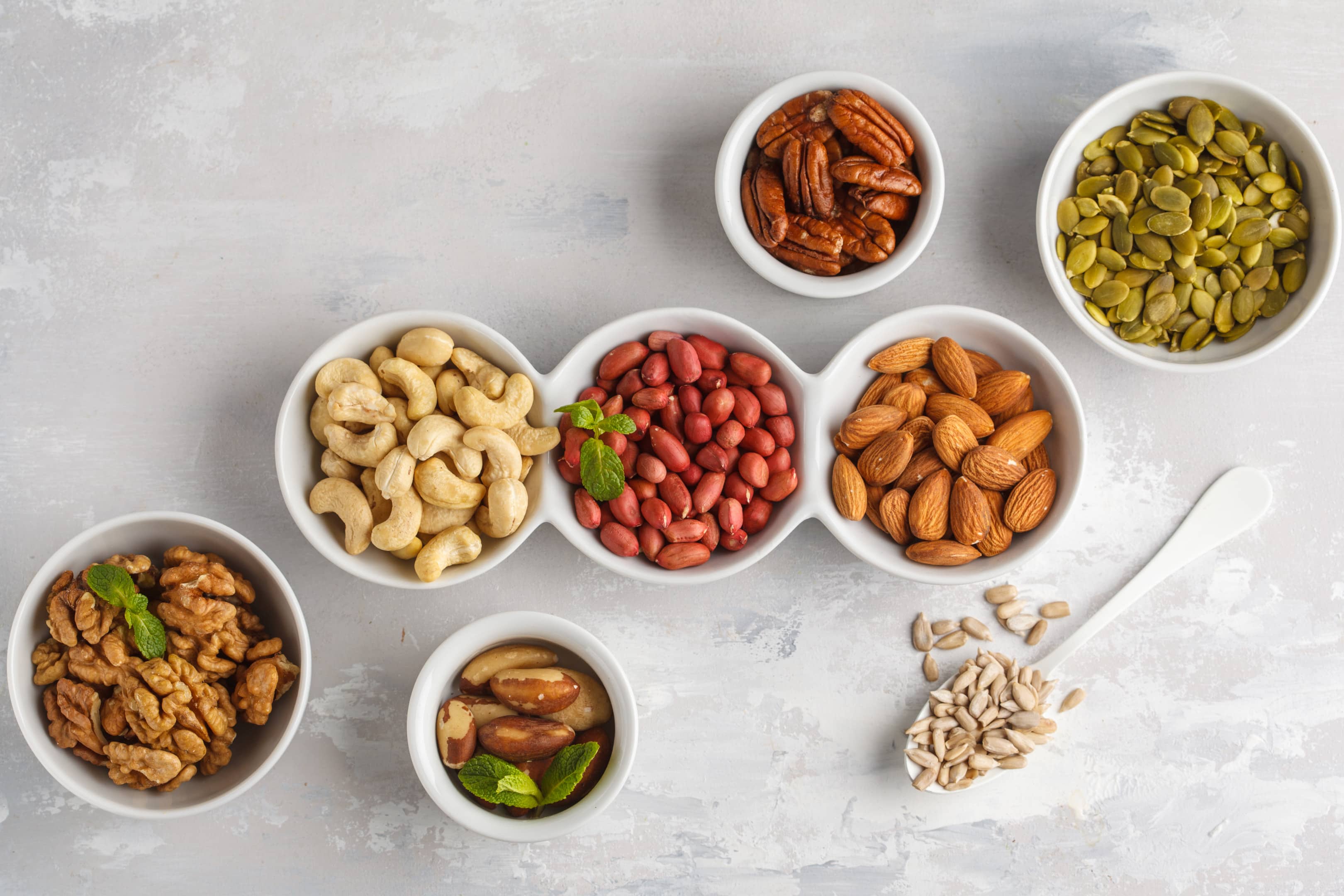
If you're looking for low-carb, keto-friendly nuts, make sure you include some of these to your emergency snack stash.
- Sunflower seeds — At 6 grams of carbs and 14g of fat, these seeds fit keto requirements like a dream. Their high levels of antioxidants and minerals also help fight certain types of diabetes and reduce cardiovascular risks.
- Pecans — These high-fat nuts contain 4 grams of carbs per ounce of serving. Pecans help inhibit insulin levels.
- Brazil nuts — At 3 grams of carbs, they are an excellent food for keto. Brazil nuts also contain traces of selenium, a mineral associated with reproduction and protein synthesis.
- Chia seeds — The fat content of chia seeds mostly comprises omega-3 fatty acids, which have anti-inflammatory properties and help in lowering blood pressure.
- Flax seeds — These high-fiber seeds contain 9 grams of carbohydrates. They help with digestion and reduce blood pressure levels upon regular consumption.
- Walnuts — These high-fat nuts benefit heart health by regulating cholesterol and blood pressure levels.
- Hemp seeds — These keto-friendly nuts contain only 2 grams of carbs per serving. They are an essential source of linoleic fatty acid, which helps in fighting neurodegenerative diseases.
- Hazelnuts — These nuts are an important source of Vitamin E and help reduce risk factors associated with heart diseases.
Are sunflower seeds healthy?
Whenever you read about healthy seeds, chia and flax occupy the limelight. The lesser-known sunflower seed has tons of nutritional value that very few people are aware of.
Nutrition and calories in sunflower seeds
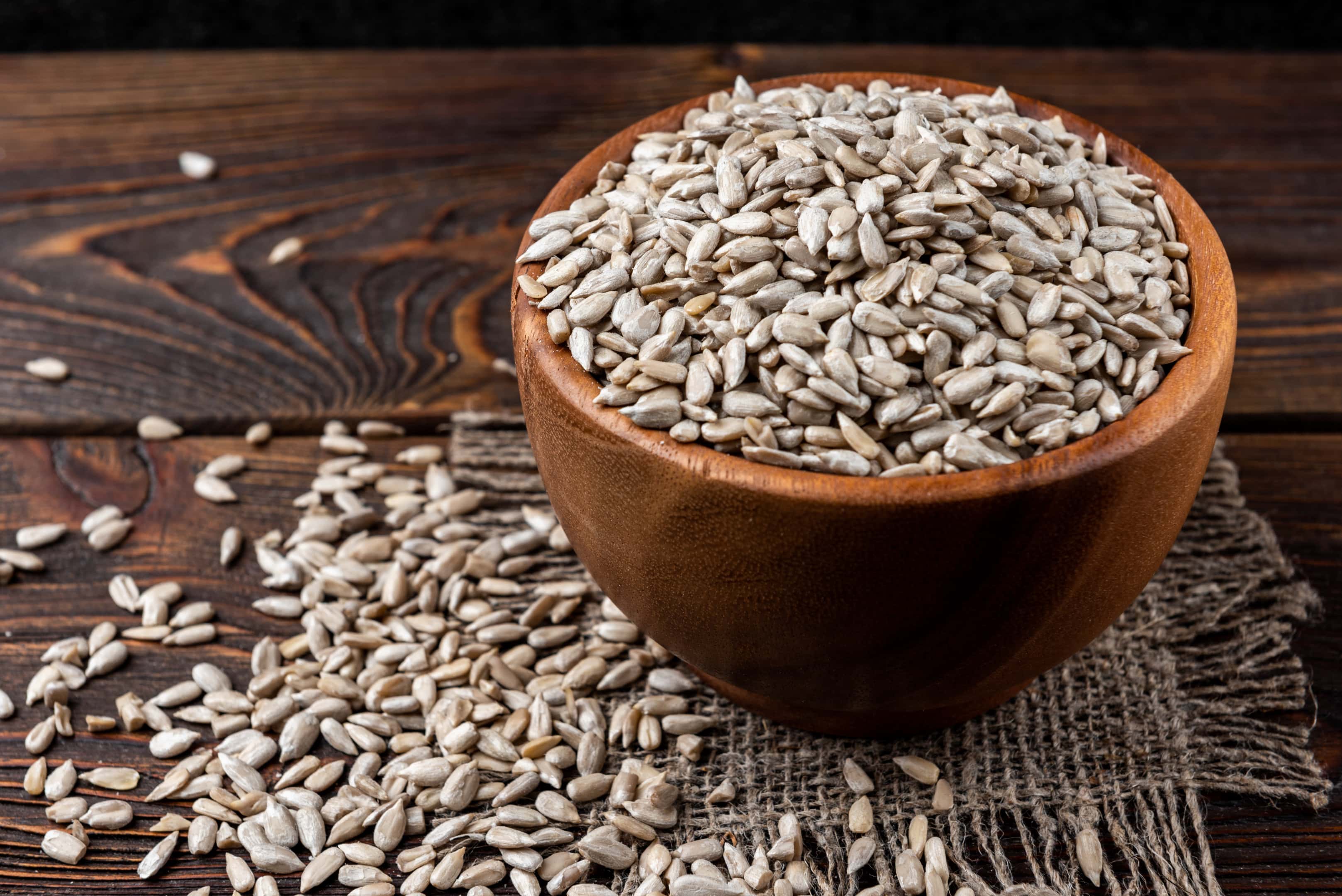
Sunflower seeds have a rich nutrient profile. A single serving (around 4 tablespoons) contains:
- Calories — 164
- Protein — 6 grams
- Fat — 14 grams
- Total carbs — 6 grams
- Fiber — 2 grams
- Net carbs — 4 grams
The high fat and low carb proportion make sunflower seeds and keto an excellent match. The fats are a mix of monounsaturated and polyunsaturated fats, which help combat factors responsible for heart-related diseases. The presence of protein and fiber makes you feel full and prevents unnecessary binge-eating.
Sunflower seeds also contain trace minerals and macronutrients like Vitamin E and B6, folate, phosphorus, selenium, manganese, copper, and zinc. Even if you’re not a keto dieter, eating a handful of sunflower seeds every day can improve your health by a long shot.
Sunflower seeds and pregnancy
During pregnancy, it is critical for a to-be mother to take care of her diet. An essential nutrient that is necessary during the initial stages of pregnancy is folate. Gynecologists often prescribe dietary supplements containing folic acid to expectant mums. Folates play a vital role in the formation of red blood cells and DNA synthesis.
If you’re in the stage of planning for motherhood, start including folate-rich foods in your diet. Some familiar sources of folic acid include leafy vegetables such as spinach and kale and sweet fruits such as melon and apricots. Fish, liver, and avocado also contain adequate amounts of folates.
Pregnancy is infamous for its onslaught of random food cravings. Most expectant mothers tend to put on excessive weight as a result of constant eating. Sunflower seeds can come in very handy during this time. They are rich in natural folates and tons of other essential vitamins, making it one of the healthiest foods you can snack on.
Sunflower seeds and diabetes
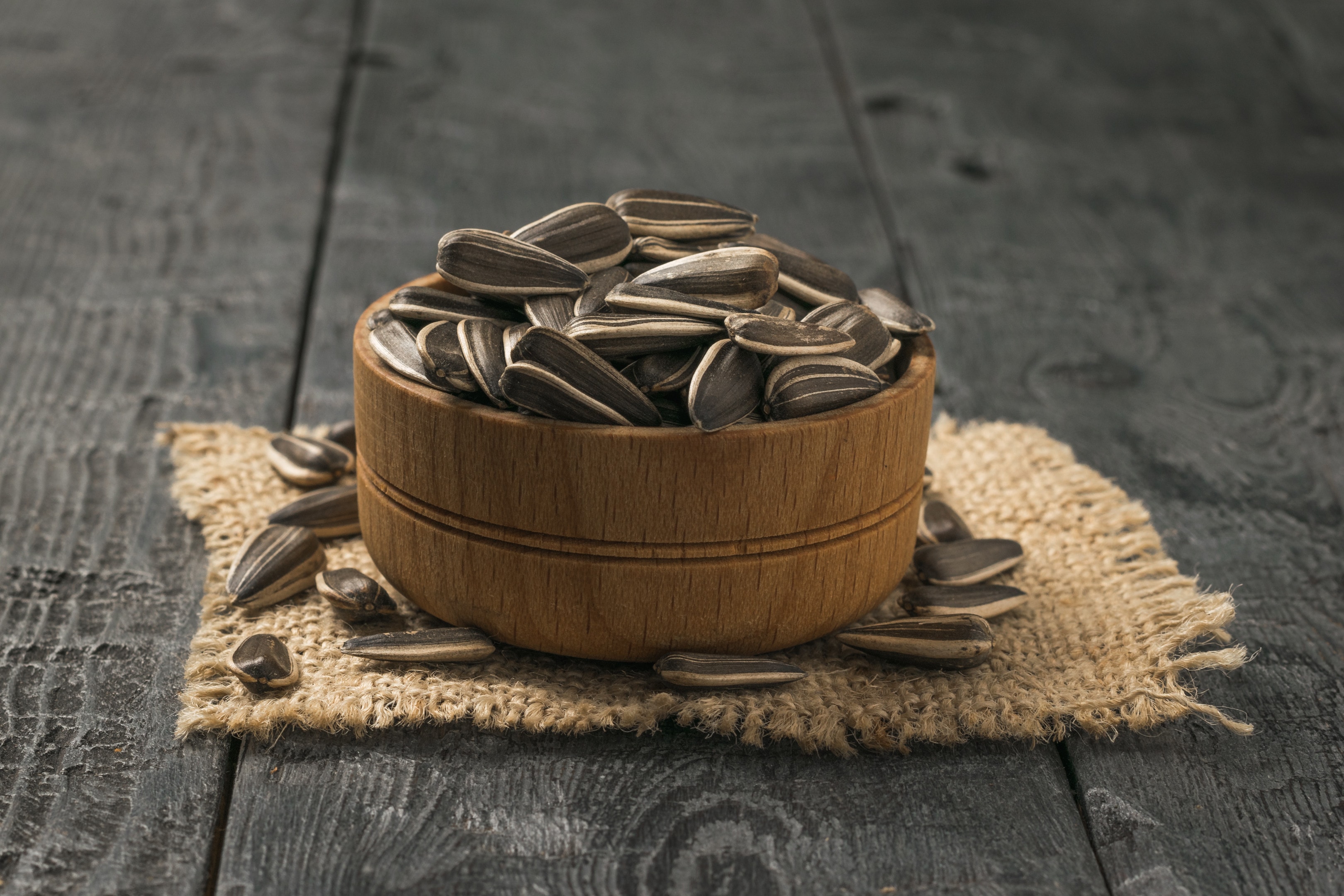
Being diagnosed with diabetes is a daunting experience. You may require significant changes in your lifestyle and food habits to cope up with diabetes. While diabetes can take various forms, the most common one that affects adults is type-2 diabetes. The insulin production in your pancreas is greatly affected, leading to a considerable rise in blood sugar levels in your body. What makes it more dangerous is that high blood sugar makes you prone to cardiovascular diseases, and in the worst-case scenario you may have a heart attack or stroke. People with type-2 diabetes must be mindful of what they eat and control their sugar intake.
Although diabetes cannot be “cured” completely, you can easily manage it with a few tweaks in your diet and lifestyle. Certain seeds play an important role in regulating blood sugar levels. Sunflower seeds, in particular, contain nutrients like vitamin E, vitamin B-1, copper, antioxidants, and fiber, all of which help fight diabetes. You can snack on the raw seeds, sprinkle them over salads and curries, or even add them to your breakfast smoothies. These seeds not only help in lowering blood sugar but also keeps your appetite in check.
Are sunflower seeds gluten-free?
In the last couple of years, a gluten-free diet has gained a strong foothold. For those who don’t know, gluten refers to a group of proteins that are present in grains such as wheat, rye and barley.
2.5% of the world population is allergic to gluten
Such numbers are why we are seeing an increase in awareness, and more people opting to go gluten-free. While gluten is not something particularly “dangerous”, those who are allergic or sensitive to it, can have a hard time. Moreover, for those suffering from the autoimmune disorder called celiac disease, gluten tends to damage the small intestine.
Studies show that whether or not you have a problem with gluten, avoiding it can be beneficial for your overall health. Gluten proteins are not very easy to digest and can lead to bloating, indigestion, and, in severe cases, ulcers.
Luckily, most nuts and seeds are gluten-free in their unprocessed forms. Sunflower seeds are gluten-free, as long as you consume them raw. Processed snacks, despite their “healthy” taglines, are often coated with wheat. This transforms originally gluten-free foods into unhealthy edibles. When purchasing sunflower seeds, check the ingredient list carefully for the presence of wheat, barley, or any other flours.
Can sunflower seeds make you fat?
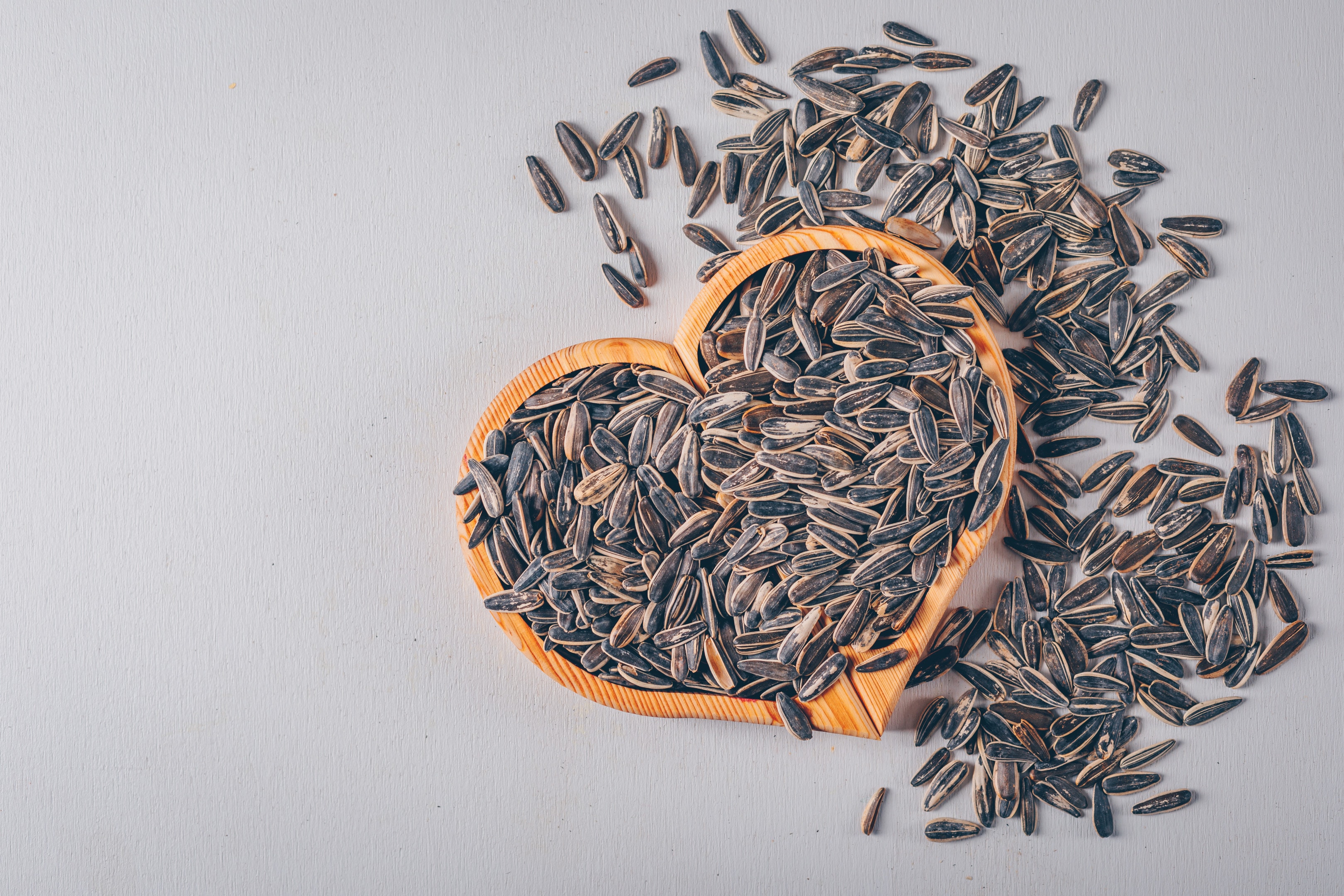
There’s a reason why sunflower seeds are keto-approved. The ketogenic diet serves to reduce your weight, not increase it. If followed correctly and with due diligence, your body will burn the excess fats through ketosis. For ketosis to actually work, you have to make sure you limit your carb intake to less than 20% of your entire diet. A mix of saturated and unsaturated fats must make up 70% of your meals, with proteins, vitamins, and other nutrients occupying the remaining 10%. Sunflower seeds fit this description from all angles.
However, if you consume sunflower seeds simply as a snack, without lowering your carb intake, you will definitely put on unwanted weight. Most of these snacks are coated with various seasonings, which may or may not be good for your diet or health. Sunflower seeds for keto and weight loss are best consumed raw.
Sunflower seeds and pumpkin seeds
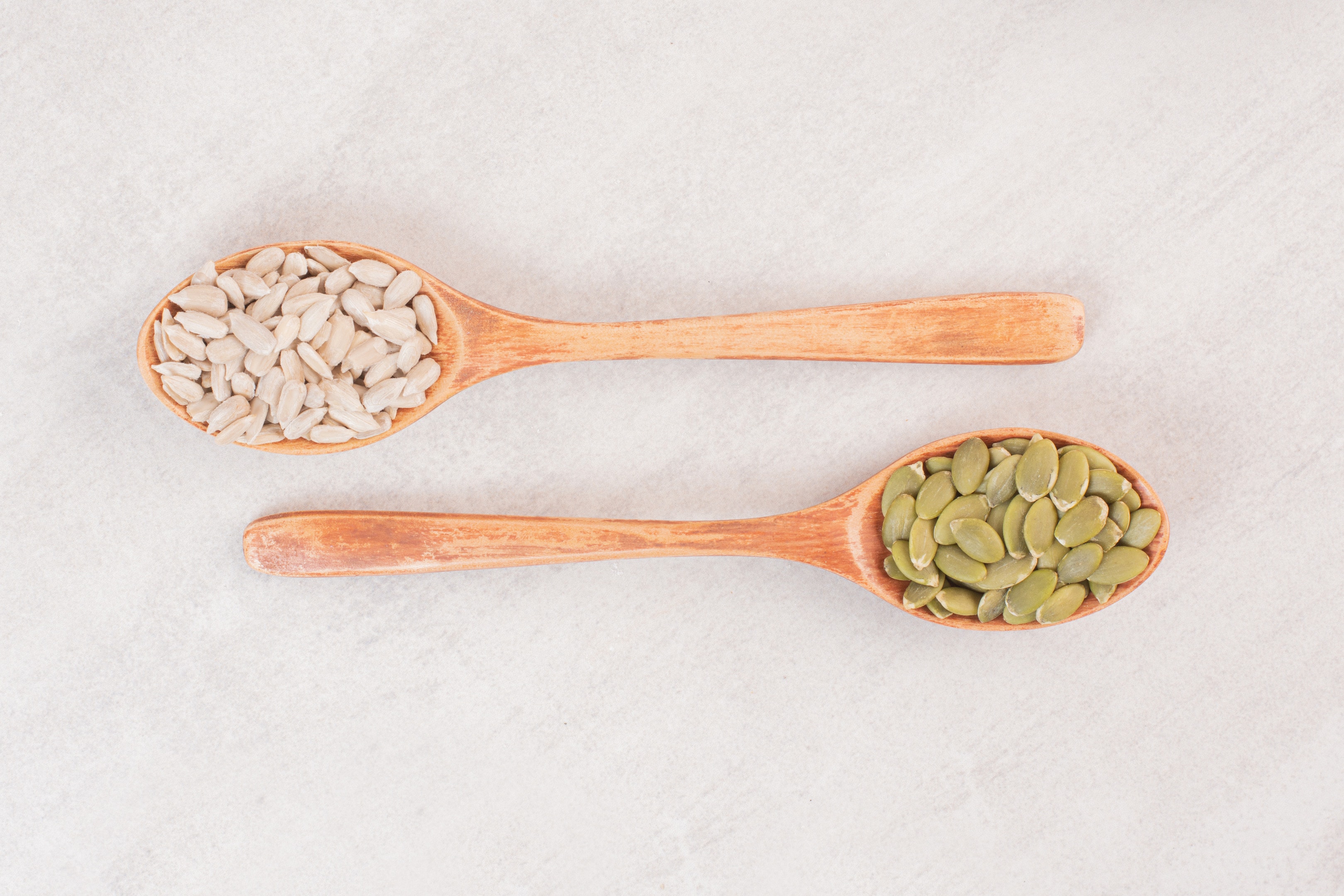
Sunflower seeds and pumpkin seeds share a similar nutrient profile. Both are rich sources of fat, protein, and dietary fibers, along with good quantities of other nutrients. Pumpkin seeds are more common in the kitchen and in everyday use. Sunflower seeds have taken time to appear on the radar of health experts. Now, you can easily switch one for the other for a variation in taste. If you’re suffering from stomach related issues, like indigestion or constipation, sunflower seeds are the better option for its higher fiber content. A single serving of sunflower seed also packs in more fat, which makes it a better choice for keto dieters.
Conclusion
The myriad health benefits and their appetite satiating qualities are what makes sunflower seeds keto-friendly and an excellent addition to your diet. Next time you go for your grocery shopping, look out for a pack of these powerhouse foods and take a step towards healthier living.






